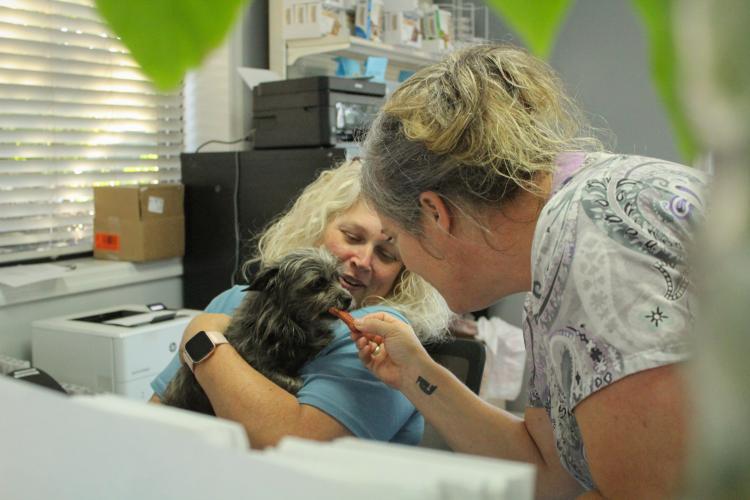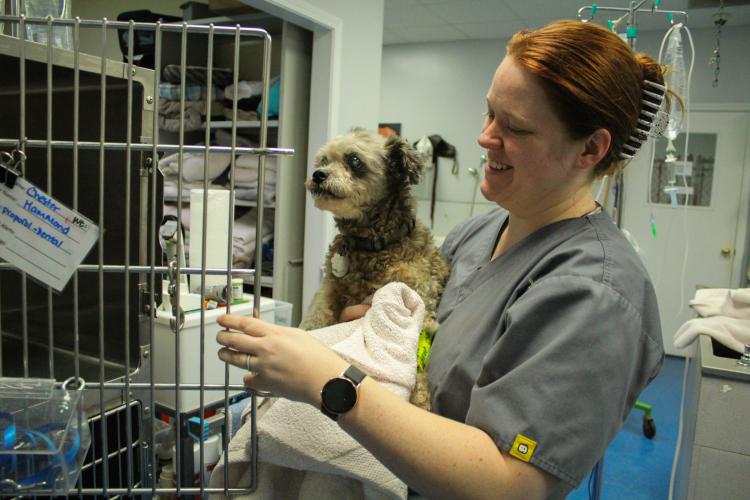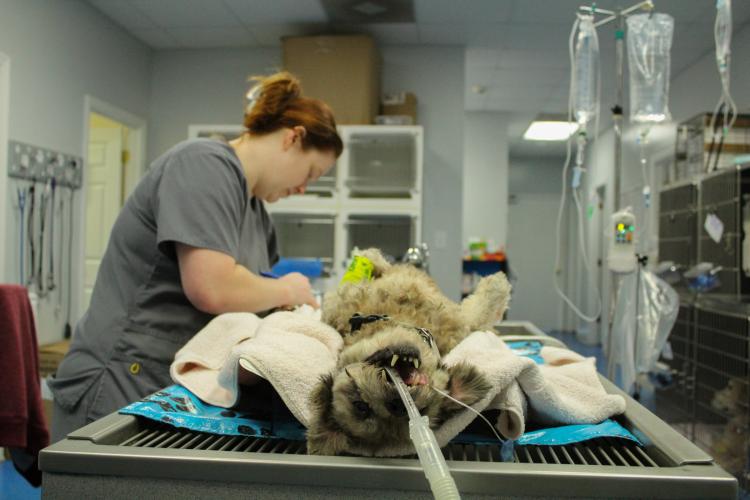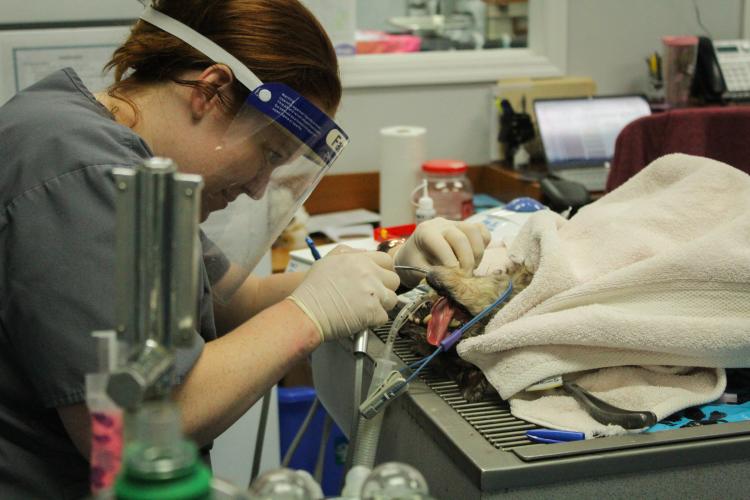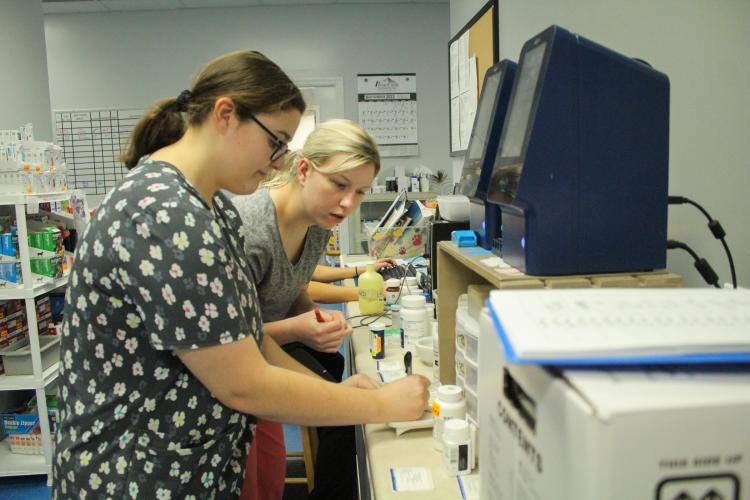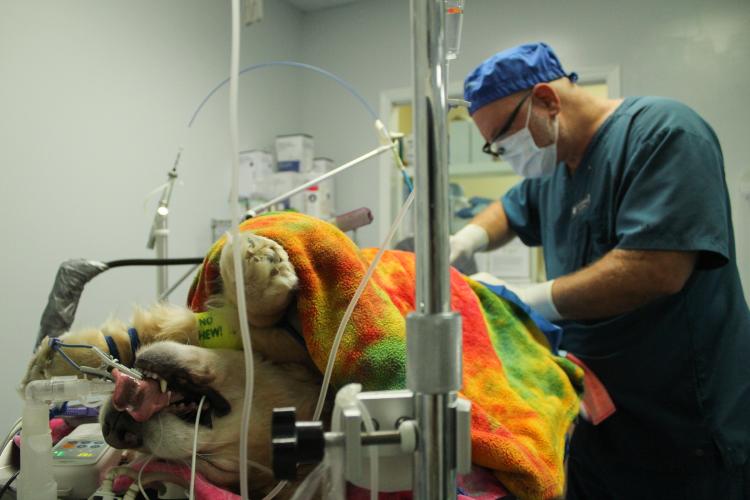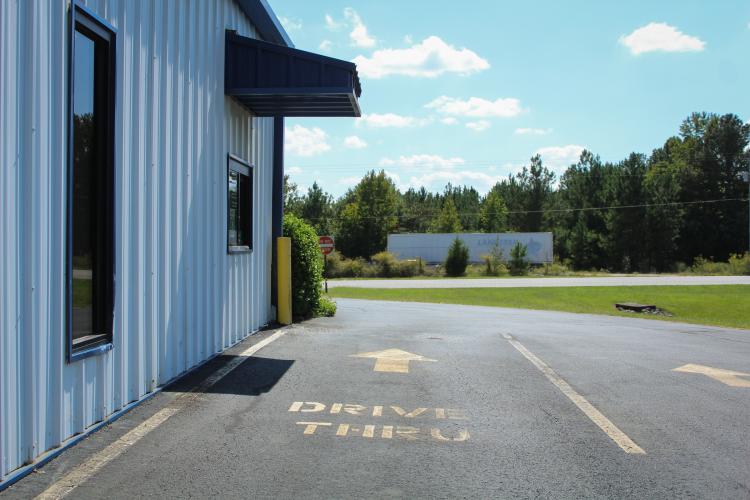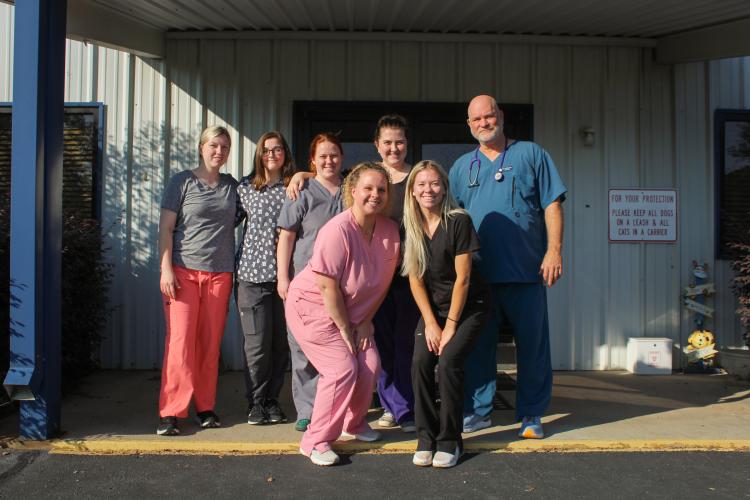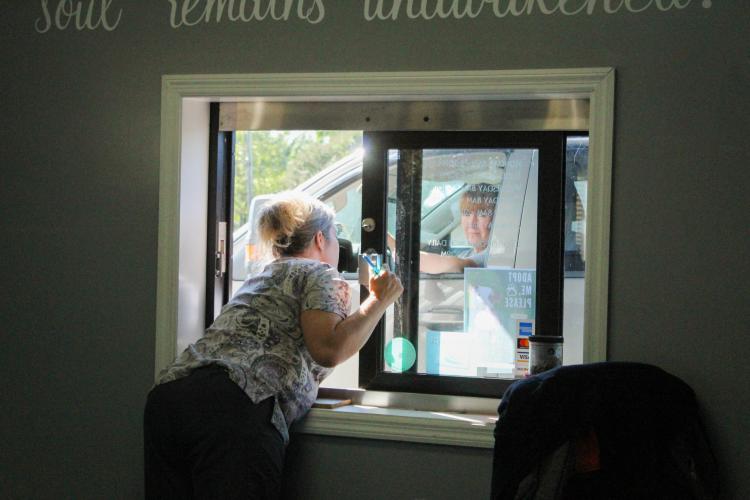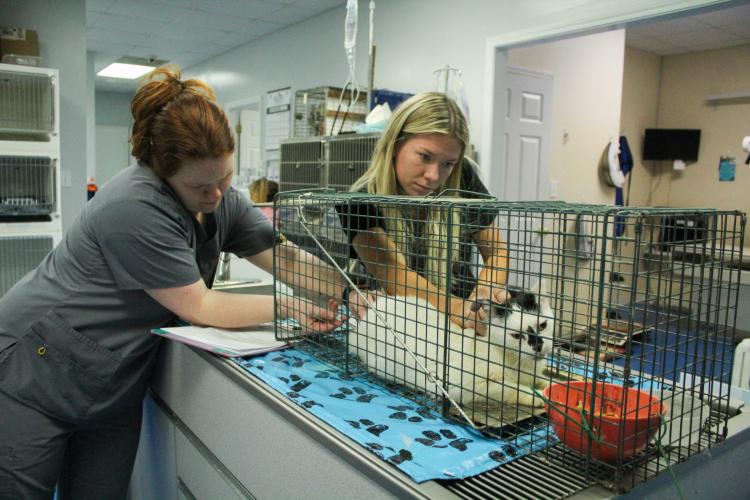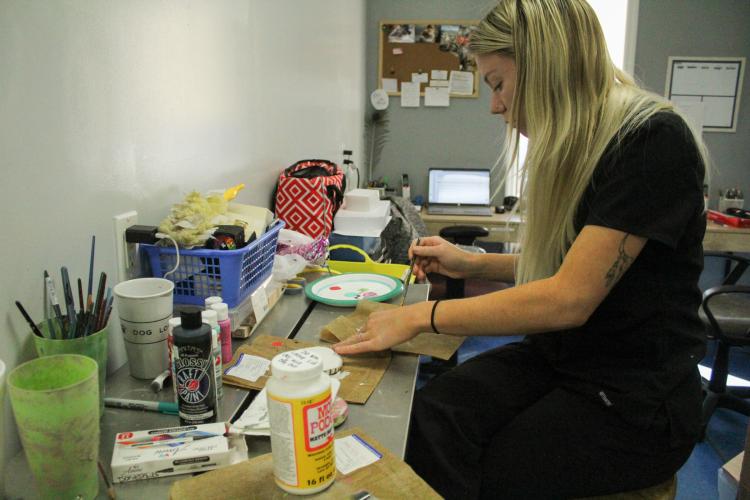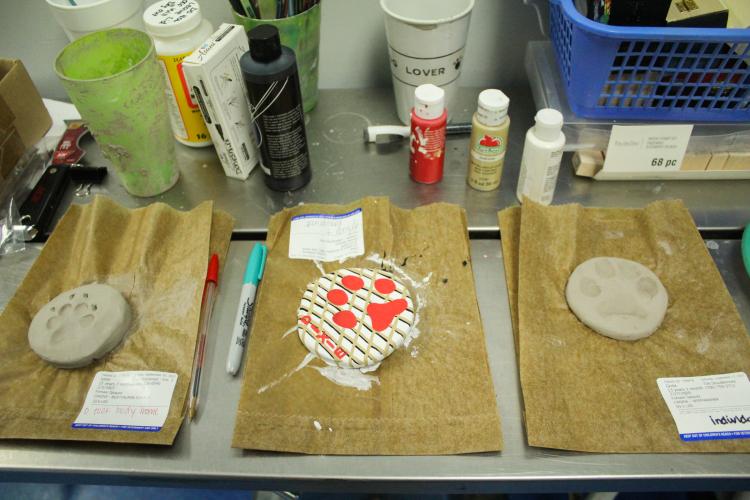Oglethorpe Animal Clinic fights battle against rising costs, vet shortages
WATCH: On front line for pets: Inside the Oglethorpe Animal Clinic
Oglethorpe Animal Clinic provides general care to the animals and beloved pets of the county. On a typical day, staff see patients for spays and neuters--about 15-20 a week--but also wellness appointments, vaccinations, dental care and various surgeries.
Proximity to the University of Georgia brings in a revolving door of vet students looking to gain experience and allows Oglethorpe Animal Clinic to outsource certain operations to UGA's specialty clinics.
However, this proximity is a double-edged sword.
"Finding good tech vets is challenging. A lot of techs will just go straight to UGA, said Hillary Whiddon, practice manager for Oglethorpe Animal Clinic. "UGA is such a big vet hospital that there are so many specialty clinics, and a lot of tech will decide that they really want to specialize in this thing or that thing."
And that can be challenging for a general practice that does a bit of everything, especially when, compared to human medicine, the veterinary field lacks mid-level practitioners to buffer the workload.
"You would never go to a doctor's office where they are going to do surgery, clean teeth, take X-rays, do blood work, and see you and your children. We do all those things in one day," she said. "A generalized vet is literally doing everything from surgery to puppy appointments to everything in between. There's not a break."
Veterinarian Ed Rowan was succinct: "We simply need more vets."
Tough times
This need for more vets was painfully clear in the face of COVID-19.
Categorized as an essential service and flooded with a barrage of new pet owners fighting lockdown boredom, the clinic stayed open and steadily busy. But supply couldn't keep up with demand.
Like many professions, the veterinary field felt the brunt of the pandemic's supply collapse.
"What people don't realize is that a lot of the medications we use in veterinary medicine," Whiddon said. "During COVID, especially, medications were being used so readily in the hospitals, we were running out of stuff all the time."
In addition to keeping supplies stocked, the clinic struggled to keep up with cost inflation, a problem that persists.
An AHA report claims that average hospital drug costs increased by 28% by the end of 2021, and many medical supplies, including everyday items, such syringes, jumped 20.6% per patient.
"The same companies make them for the human world and the vet world and the dentists," Rowan said. "When it gets to only one company making syringes, they're going to jack that price up because you know you've got to buy them. You have no choice."
The demand for medical goods was stretched further in Oglethorpe County, where a lack of animal control has contributed to an uptick of strays. Residents who find animals often take them to the Madison Oglethorpe Animal Shelter (MOAS) in Danielsville, which is at capacity.
Working in a rural community also presents challenges. The land doubles as a habitat for wildlife, like raccoons and foxes, that carry and transmit diseases, including rabies.
"Luckily, most people vaccinate their dogs and cats for rabies, but there's a lot more stray animals running around exposing people's pets to different things like fleas and ticks and worms," Rowan said.
Unexpected costs
Paying for the strays brought into the clinic is a difficult surprise for the county's residents.
"A lot of people will pick up stray dogs and cats and bring them in to try to help them, and most people don't expect to then have to pay $200 for everything they need."
Oglethorpe Animal Clinic recognizes the financial burden this could put on a family individual, so "sometimes, if there's an emergency that comes in, we'll try to do everything we can to make sure they can afford that," Whiddon said.
Sometimes it's difficult for people to pay for the pets they own.
"Rural communities sometimes struggle with making sure prices are met because there are some people who love their pet so very very much, but just aren't able to afford as much," Whiddon said.
The clinic tries to keep its prices competitive so the business can continue to operate but inflation has made it tough for some owners to keep up.
"It is difficult when you have people that really need help, but you have to make the judgment call on what can you sacrifice and eat price-wise to help them out," Whiddon said. "We try to do that as often as we can to help out the community and help out the pet owners who really cannot afford to do something for their pet that they need or want done."
But compared to the past, 21st century pets have it good.
"People didn't have a lot of money to spend on their pets back in '93," Rowan said, referring to the year he purchased the clinic. "What people do to take care of their animals is a lot better. They just have more resources and able and willing to spend more money."
And for good reason.
"Most families would consider their pet to be part of the family."
The pressure to comfort both pet and owner can cause emotional strain for the staff, and the compassion fatigue that accompanies them can become difficult to manage. In addition to making judgement calls on strays and keeping up with post-COVID demand, veterinarians have to deal with the everyday stressors of gruesome injuries and euthanasia procedures.
"When you dealing with death on a daily basis it does sting," Whiddon said. "You have to develop that ability to separate yourself from it without separating yourself too much and becoming jaded and saying 'it is what it is'"
The toll taken on the mental health of veterinarians is often overlooked and has only gained attention in recent years, such as with the emergence of Not One More Vet, an organization that seeks to create mental health awareness and support for veterinarians.
"Veterinary professionals have one of the highest suicide rates of a lot of professions, so mental health is very important," she said. "Anxiety disorders in vet med are also really high. There are a lot of things that the general public don't realize."
Unfortunately, Rowan has witnessed this toll firsthand.
"I've had two vets that I personally knew that committed suicide," he said. "It's a big deal. It's a stressful job, but we do everything we can to make our workplace a pleasant environment for our work staff. We try to do everything we can to foster a positive environment here."
Oglethorpe emphasizes the need for communication between staff and encourages those who are struggling to seek help, either through counseling or through the comfort of coworkers who have experienced similar things.
"We're a really big family here. We're really close-knit. I think everybody feels comfortable talking about what's going on with them," Whiddon said. "I think there's something in feeling those emotions, but you don't want to over-feel them either."
For some, like vet tech Samantha Bell who is following in her mother and grandmother's footsteps, her passion for animals overrides the discomfort.
"I just had the same passion [they] did growing up and loving animals."
For many vets, seeing the change they've made helps keep them going.
As Whiddon said, "Every animal that walks into this clinic makes a difference for us and we make a difference for them and their owners."

